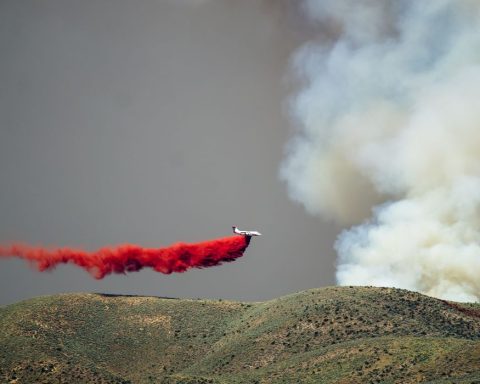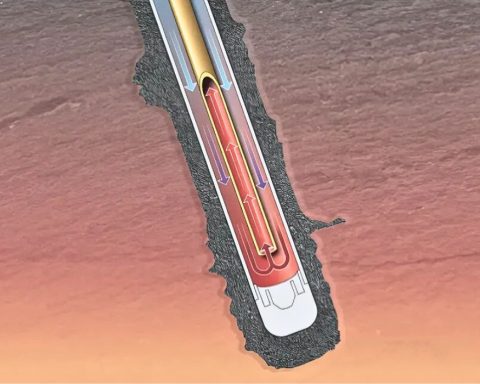If you’ve ever thought that you might need a self-help book to get through the climate crisis, Naomi Klein’s new book, which goes on sale today, may be the one you’ve been waiting for.
Klein’s book does everything a good self-help book should: It urges the reader to admit they have a problem, it provides a narrative to better understand their issues and it gives them the tools they need to make a change. This Changes Everything does all of this with great to moderate success.
Left unchecked, “our culture will do what it is already doing, only with more brutality and barbarism, because that is what our system is built to do,” Klein says with trademark frankness.
Like a bad relationship, Klein shows us that our reliance on endless consumption, free market mentality and extractive culture have left us isolated and convinced that we are not only incapable of saving ourselves, but we are actually not worth saving at all.
Klein is at her best when she is showing, in plain terms, how systemic forces are affecting our planet, our communities and our personal lives. The connections that she draws between global events are so obvious and simple that it seems as if we must have known these things all along. This may be the secret behind her “clairvoyant skill of nailing a subject before anyone gets there,” as her friend Katharine Viner, U.S. editor in chief of The Guardian, explained in Vogue last month.
But when you look closely, you can see that Klein is not telling us anything new; she is re-telling and re-contextualizing many familiar stories to give us a more cohesive picture of current events.
Take, for example, the story of two parallel negotiations that took place during the 1980s: climate and free trade. The former is regulated based on an honor system, while the latter is enforced by a dispute settlement system with monetary consequences for offenders. One puts limits on big business in order to protect the planet; the other protects big business from those exact regulations. It is no wonder corporations and governments do not take climate negotiations seriously.
Klein’s reminder of our priorities in the 1980s makes it easy to think that simply rewriting trade rules in favor of the planet can solve the climate crisis.
But, of course, it can’t be that simple. If we stand a chance of surviving on this planet, Klein says we not only need to rewrite the international trade rules that have governed our economies for the last few decades; we also need “managed de-growth,” or more dramatically, “The Great Transition.”
Any solution to the climate crisis outside of radical economic transformation Klein dubs “magical thinking.” We cannot rely on the market, billionaire philanthropists or even technology to save us. Instead, she says, we need a “mass movement of movements” that will force governments to revive the lost arts of long-term planning and saying “no” to fossil fuel companies.
Movement matters
Klein’s first book No Logo is considered by many to be the “Bible” of the anti-globalization movement—the first iteration of the “movement of movements” that successfully shut down the World Trade Organization meeting in Seattle in 1999. This Changes Everything chronicles how Klein (and her readers) got from No Logo to today.
While the anti-globalization era of protest was intentionally amorphous and without clear leadership or direction—a direct response to the hierarchical, oppressive global systems that the movement was attempting to challenge—climate change has finally given these groups something around which to coalesce.
To anyone who was paying attention to the United Nations Fifteenth Conference of the Parties (COP15) in 2009, it was clear that something new was happening on the streets of Copenhagen — the climate justice movement was being born. This moment of crystallization, which Klein describes so well, has unprecedented potential to solve not only climate change, but also a wide array of problems that the world’s most vulnerable populations are facing.
The urgency of the climate crisis has formed “the basis of a powerful mass movement, one that would weave all these seemingly disparate issues into a coherent narrative about how to protect humanity from the ravages of both a savagely unjust economic system and a destabilizing climate system,” says Klein.
But it’s precisely at this moment – when Klein switches from speaking about the past to the present – where the book’s tone goes from prophetic to slightly depressing. This movement of movements, while inspirational, has had few concrete successes so far and has a long way to go (and will face much more violent repression along the way) before it will achieve the kind of transition that Klein says we need.
Protest groups, such as Idle No More and 350.org, which stalled the Keystone XL pipeline, have without a doubt affected our collective consciousness, increased the power of Indigenous groups and damaged the social license of extractive companies. But the level of collective action that will be required to make the kinds of changes that is Klein advocating for have few, if any, historical precedents.
Yet, tens of thousands of people from across the United States are preparing to descend on New York City for the People’s Climate March next Sunday, which is expected to be the largest climate march to date. Their aim is to begin pressuring United Nations member states to come up with a binding agreement that will replace the Kyoto protocol, which comes up for renewal in 2015.
And with dozens of groups around the world marching in their own streets, it could be a day when the “movement of movements” shows its potential to push for the kind of systemic change that Klein (who is the keynote speaker at the event in New York City) is looking for. In that sense, the release of Klein’s book is well timed, and I expect to see a copy in the hands of many an activist next week.
Corporate Knights will be covering the United Nations Climate Summit, as well as the Peoples Climate March in New York City from September 19 to 23.







